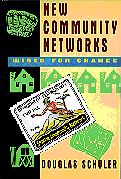


|
New Community Networks: Wired for Change.
Douglas Schuler. Subject Headings:
Adult. **** /4
|

excerpt:
Before computers took center stage, the term 'community network' was a sociological concept that described the pattern of communications and relationships in a community. This was the web of community that described how news traveled and how social problems were addressed in the community. New computer-based 'community networks' are a recent innovation that are intended to help revitalize, strengthen, and expand existing people-based community networks much in the same way that previous civic innovations have helped communities historically.New Community Networks is a lengthy discussion and unique contribution to the available literature on the social uses of technology. It reveals how "communities will need to work together to build interlacing (computer) communities of communities that can help address problems that transcend community boundaries." For Schuler the time is very right to be moving towards developing new community networks since the "privatization of leisure," among other factors, has been steadily undermining community life.
Schuler is chair of Computer Professionals for Social Responsibility and a founding member of the Seattle Community Network. He has edited several books and articles, including an article in Communications of the ACM that Apple librarian Steve Cisler called "the definitive article on community networks." He is a software engineer who has been working on social issues of computing for nearly 15 years.
In New Community Networks Schuler examines the issues that are essential for the success of a community-based network. He presents a number of eye-opening case studies such as the Santa Monica PEN project, the Cleveland Free Net, and the Big Sky telegraph system in rural Montana. Schuler reminds his readers that community network terminals must be set up in as many public places as possible. Most people do not own computers so easy access at such locations as libraries, bus stations, schools, laundromats, and senior centres should be provided for all citizens. "The use of a text-based community network would offer settings and occasions where the disadvantaged can be accepted as equals." Where the cafeteria or pub once offered a public meeting place to socialize, the computer networks will now offer a "level playing field." Because information is the raw material of knowledge, and knowledge brings power, more and more people will potentially be empowered through the opportunities provided by these new community networks. When given the opportunities of life, people will succeed. Remove these opportunities, and the alternative is failure.
Because Schuler has been personally involved with the creation of a community network, he is able to present both the short and long term concerns involved with such a comprehensive development. The many charts, sample Web pages, and icons together with the multi-level breakdown of topics within the eleven chapters make the book both credible and user-friendly. Between the Table of Contents and rather extensive appendices, any one individual or group embarking on the seemingly overwhelming task of establishing a computerized community network will have many of the resources already at their fingertips.
Whether you are a community library interested in creating a Free Net service or a group seeking ways of improving a community, New Community Networks has the guidelines, the resources, the outlines of the benefits and pitfalls, the organizational charts, and even the necessary evaluation tools. Why try to "reinvent the wheel" when such an invaluable reference is so readily available?
Highly recommended.
Floyd Spracklin is an English Language Arts Department Head and teacher at G.C. Rowe Junior High School in Corner Brook, NF. He has been teaching, writing, and reviewing literature for twenty-five years. Floyd has published a number of short stories, essays, and poems in Canadian magazines.

To comment on this title or this review, send mail to cm@umanitoba.ca.
Copyright © 1996 the Manitoba Library Association. Reproduction for personal use is permitted only if this copyright notice is maintained. Any other reproduction is prohibited without permission.
Published by
The Manitoba Library Association
ISSN 1201-9364
AUTHORS |
TITLES |
MEDIA REVIEWS |
BOOKSHELF
BACK ISSUES |
SEARCH |
HOME